Column: At 19, he’s still searching for the home he’s never had
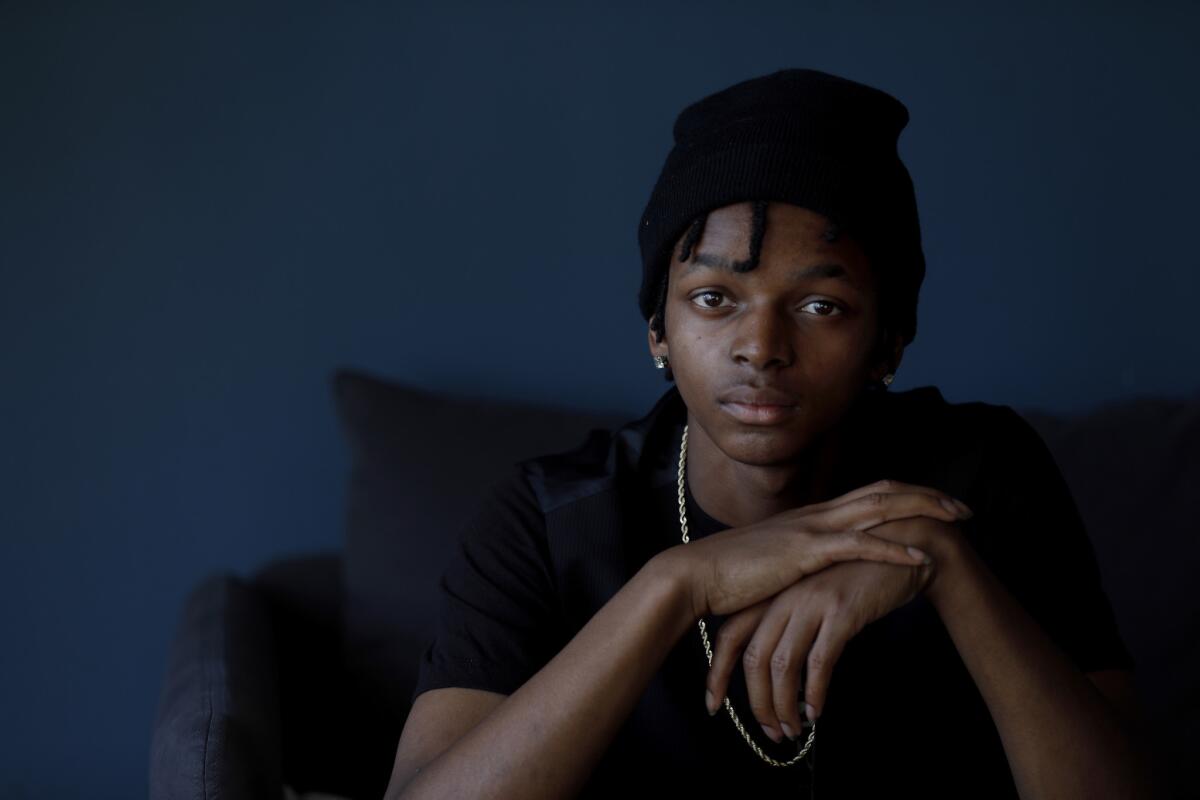
- Share via
He was born in prison, to the best of his knowledge.
He is 19, and found out a few years ago that he has biological siblings, but no blood relative is a part of his life.
Dimitri Dunn devours In-N-Out burgers, and last week he got takeout from KFC, ate it and immediately went back for more. I asked the young man if he knew how to cook, because that would be a cheaper and healthier way to eat, and he said no.
We went to Ralphs and got two bags of groceries, and on the way to his apartment in Koreatown to make chicken quesadillas and spaghetti with meat sauce, I asked about his Christmas plans.
“I don’t have any,” said Dimitri, who explained that “the magic” had long ago gone out of the holidays.
How many different foster homes was he in?
“Maybe four or five,” Dimitri said, thinking it through, but that’s a lot of thinking. In our first meeting, it took him an hour to tally all the temporary quarters he’s been assigned to as a lifelong dependent of the juvenile court system. He says he can’t count the number of social workers and therapists he’s had.
“The list goes on,” Dimitri said as we approached the apartment he shares with three young men who have their own stories.
Read the series: Facing child poverty in L.A. »
In California, about 23% of our children live below the poverty line, based on incomes of $30,000 a year or less for a family of four. There’s no way to look at those numbers without concluding that we’re doing something wrong if so many children are left behind in such a robust state.
Like I’ve said, many of them will be doomed without a bigger investment in education and in the support and specific training they’ll need to have a shot at breaking the cycle of poverty they were born into. That would be both the humane and cost-effective thing to do, because childhood trauma does permanent damage, and the price of incarceration, dependency and healthcare will be crippling later on.
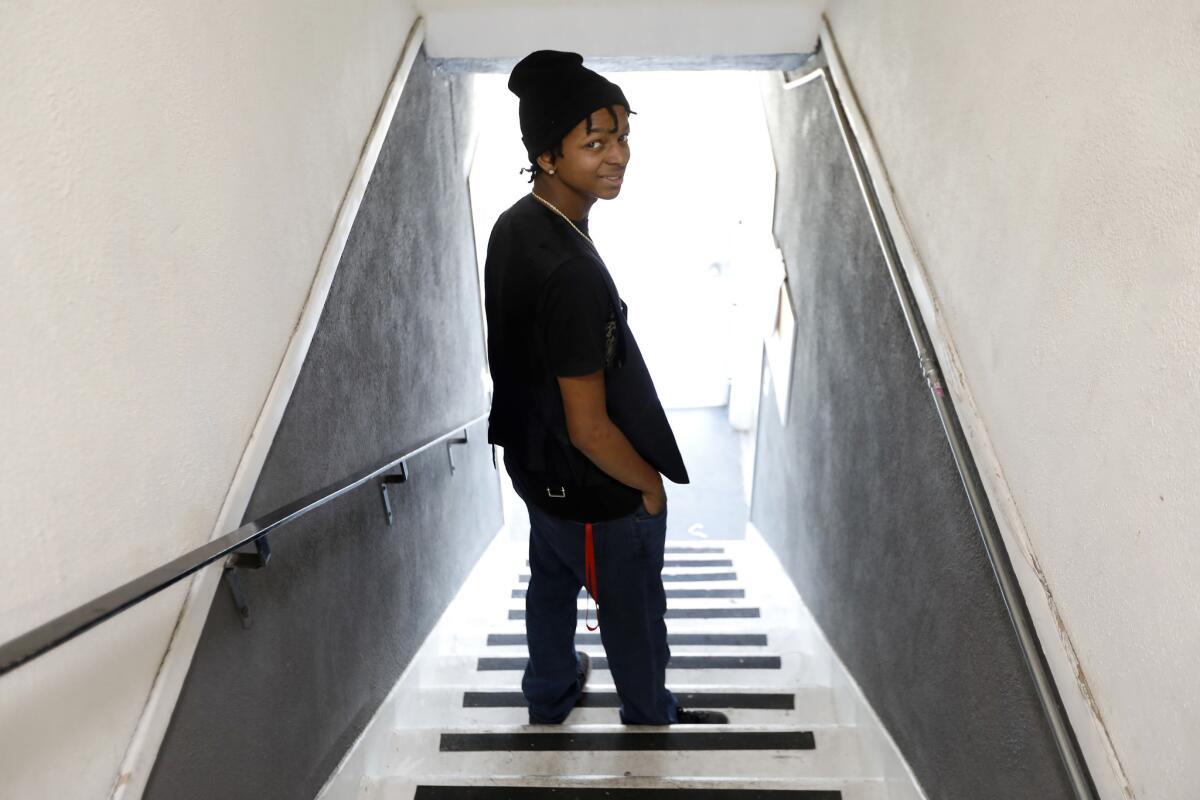
Statistics on child poverty paint a picture but don’t tell a story. So in the past year, I’ve been to health clinics, shelters, motels and garages to see the daily struggle first-hand. After spending two months at an elementary school where nearly a quarter of the students were homeless, I wanted to take a look at what happens to those who carry the burdens of poverty all the way into adulthood. The L.A. County juvenile dependency courts offered me a window.
The county has 20,000 foster children, and the goal is to get them out of the system within two years, past the trauma of instability, abandonment and neglect, and permanently place them with relatives or adoptive families. But currently, more than 2,000 young people 18 to 21 are wards of the court, and some of them are unemployed, poor, homeless or all three.
“The bottom line is that all kids need a family, and that’s really been an issue with our system,” said Michael Nash, former presiding judge of L.A. County’s juvenile courts and the current head of the Office of Child Protection.
“They’re more likely to be under-educated, unemployed, incarcerated or dead,” said Bobby Cagle, who became director of the county Department of Children and Family Services a year ago and said he’s trying to bring down the number of cases like Dimitri’s.
Dimitri said he was homeless for 11 months when he was 13 because he went AWOL from a group home. Now, through the county, he’s got an apartment, but he said he hasn’t been getting a promised monthly stipend because of some mix-up. If he goes to the Hollywood nonprofit program he’s in, he can get free meals, but sometimes he doesn’t have the money for public transportation so he makes do with what’s in the apartment, or he skips meals.
Dimitri is smart, introspective, angry, determined. He has never driven a car and he said the only vacation he’s ever had was a group camping trip to Santa Barbara County. He likes anime and he likes to read books, but not if there’s something to do on his phone, like make a music or talk-show video, or check out those made by friends or celebrities.
His roommate and buddy Travis is 20 and moved here from Connecticut two years ago. Travis and his mother were regularly beaten by his father, he told me, and as if that wasn’t enough hell to suffer, his mother later spurned him for being gay. Travis figured Los Angeles would be more welcoming, which it has been, but he ran out of money before getting a job and he says it was tough living on the streets of Hollywood for three months. He told me that he and Dimitri bonded in part because of their struggles and their attitudes.
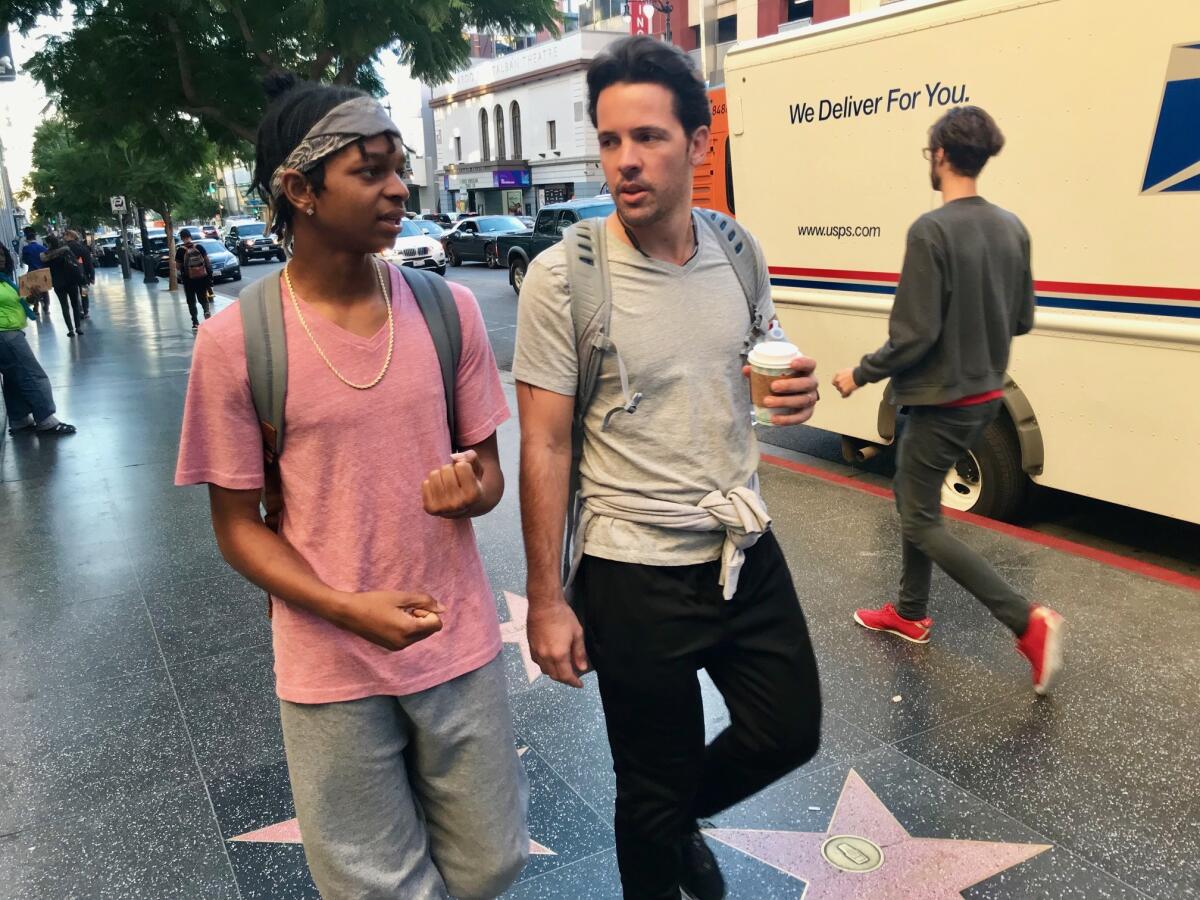
“You can tell there’s a certain amount of strength in him,” Travis said while preparing to go to Little Tokyo with Dimitri to shoot a video of Travis, who sings R&B and soul. “He wakes up and he’s not bitter, he’s not mad at the world. He’s loving and he’s determined and he looks out for not just what’s best for himself, but for others.”
Dimitri just completed a job-training program at the RightWay Foundation in the Crenshaw area. The young-adult clients have harrowing stories of abuse and neglect, and they have moved like nomads through stations of psyche-damaging poverty and social dysfunction, living on the dark side of the Golden State’s legendary culture of excess.
Nancy, a woman of 20, told me her mother and father were drug addicts, her father beat her mother in their one-bedroom home, and she and her three brothers were shipped off to live with an uncle who was a marginally better guardian. But the kids were separated when Nancy was 13 and dished off to foster care. Nancy now lives in what she described as a shabby studio apartment, she wants to be a social worker, and she has a 9-month-old baby. She said she knew that having the baby would make it tougher to get where she wants to be, but she wanted a child.
“I was tired of spending the holidays by myself,” she told me.
RightWay is run by Franco Vega, whose childhood was similar to those of his young clients.
“My mother beat me like an animal,” said Vega, who was taken in by another family until he went into the Army. He got out in 1995 and has worked with kids since then. Some have criminal records, he said, or have been trafficked for sex, and the scars run deep.
“It’s almost guaranteed for them to fail,” said Vega, who tries to use the pain his clients have suffered as a motivator to get the help they often insist they don’t need.
“I’ve known Dimitri for several months,” said Vega. “He’s very tough on the outside and has his guard on…. He’s really a traditional foster youth, raised by a system of strangers. They don’t trust anyone.”
I asked Vega why he suggested I get to know Dimitri, of all his clients.
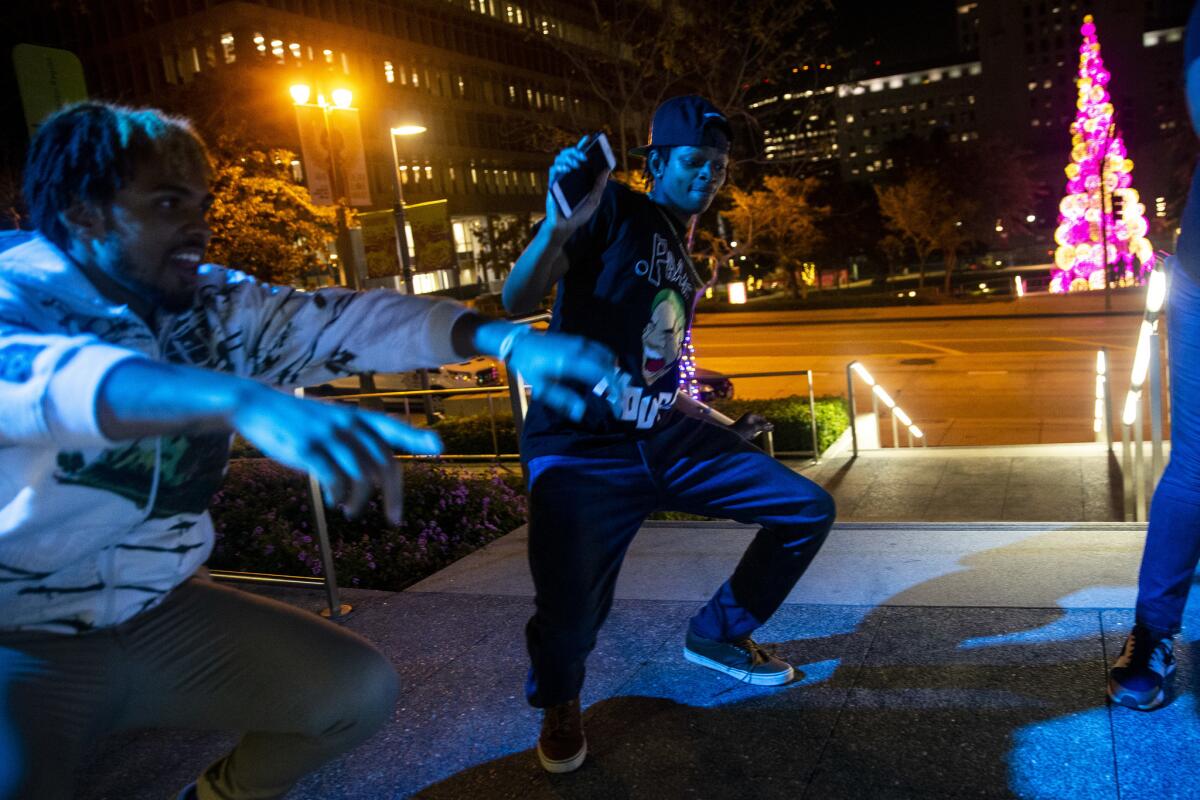
“Because I see something in him,” said Vega. “He can be disrespectful man to man, but I know it’s all a game. I know he has a soft spot and he’s not bad or a tough guy like he thinks he is. He’s a good kid. Somewhere, deep down, he’s a great kid.”
Having completed job training at RightWay, Dimitri is in line for work that will begin in January, and Vega was trying to get him something in entertainment. Dimitri wants to be a script writer, actor, musician, video producer. He says he’s going to have his own record label and when he really makes it, he’s going to buy apartment buildings where the rent will be $50 a month for people struggling to make ends meet.
“From when I first met Dimitri, the growth is amazing,” said Christian Lopez, who signed on two years ago to be a volunteer mentor to Dimitri. “When I met him he was kind of meek, didn’t talk much, and I tried to break down the barrier a little bit.”
Lopez was a longtime professional baseball player who never realized his dream of making it to the majors, and a subsequent acting career didn’t take off, either. He recently completed training to become a firefighter, and despite his own disappointments in life, Lopez wanted to do something for youngsters who didn’t know the love and stability he had as a child in Florida.
“With Chris, I really didn’t know what to think,” Dimitri said when the three of us met up at a Hollywood coffee shop. “I was like, ‘Is this going to be another guy who gets scared and is gone in two seconds? Let’s see how long it takes him to crack.’ ”
Lopez never did. They played pickup basketball together and went to movies. Dimitri began calling Lopez just to check in or ask for advice, and he had Thanksgiving dinner at the home of Lopez and his wife. They were both trying to reinvent themselves at the same time, said Lopez, and that was part of the bond.
“He could have thrown in the towel…. But he inspires me by grinding away, meeting people, networking and not giving up on life,” Lopez said. “As much as I might have had an impact on his life, he’s had an equal impact on my life.”
Dimitri called me one day to say he’d just received “some heart-breaking news.” His grandmother had died of cancer. He was referring to his foster grandmother in the home he lived in for the longest time, when he was in grade school.
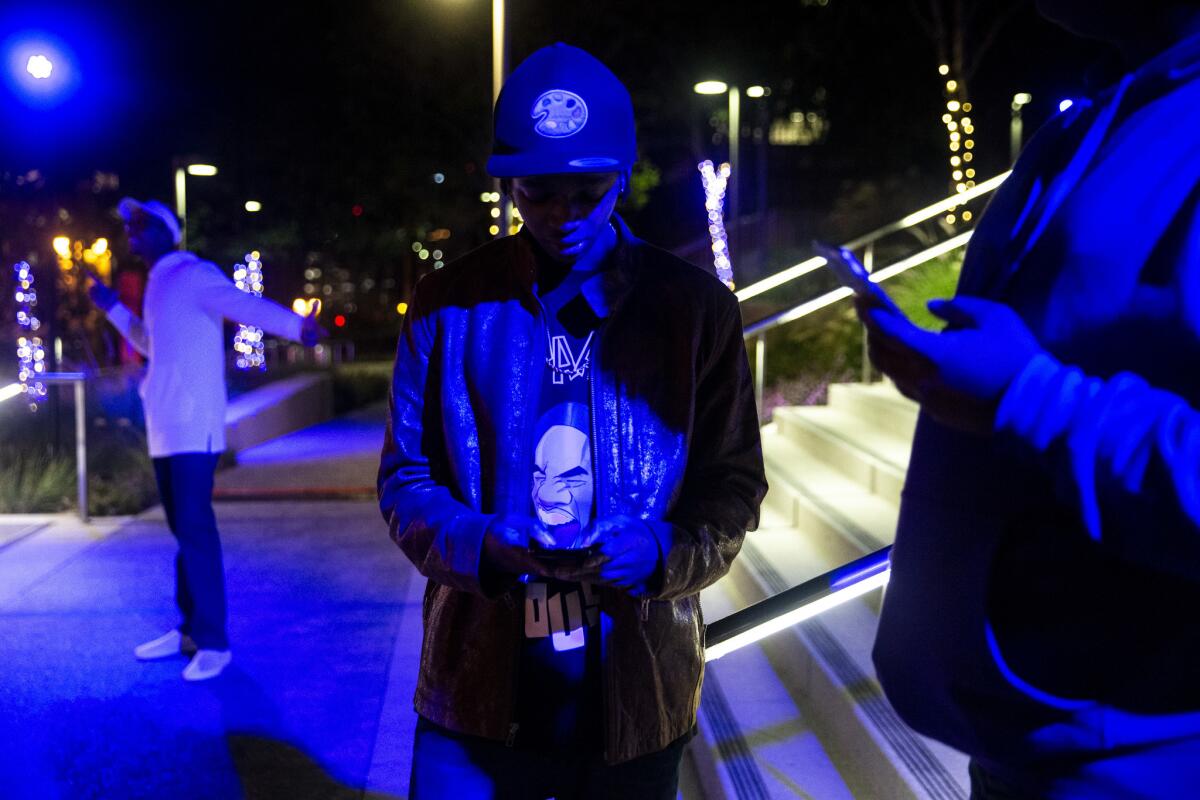
Dimitri, like any 19-year-old, can be prone to contradictory expressions. He says blood means nothing to him, that true friendship is more meaningful. But he also expresses a longing that speaks to an absence. He told me he had done his foster family wrong, stealing something, but that he was trying to make it right. He said nobody ever showed him that they really wanted him or loved him, but he also said he had sabotaged any chance of getting adopted by acting out in one way or another. His foster mother really cared about him, he said. She wasn’t just in it for the county check.
Friday night, Dimitri called me from the home of his deceased foster grandmother saying he had been to her funeral earlier in the day and was at a family gathering. He sounded reconnected and told me he had seen cousins for the first time in a while and it felt good. He put his foster mother on the phone and she told me Dimitri was a challenge as a young boy, but he seemed different to her now. She had the feeling he’d turned it around.
When he was younger, Dimitri had told me, he bypassed the gang life because that wasn’t the family he was looking for. He said he avoids drugs and alcohol because they would only hold him back. But in his lowest moments, he has been destructive, and he said that people thought he might be suicidal, even though he wasn’t.
He did what he called “stupid stuff,” the full extent of which he may or may not have been willing to share with me. He admitted that he once assaulted someone who was smiling, for no reason other than because he didn’t understand why anyone should be happy if he never was. He said he stole an iPad and landed briefly in county jail, and it was there, he said, that he had a reckoning.
“I thought, ‘What is this really going to get me?’ The main thing I’d been dealing with since birth was solitude and no consistency, but there was nothing but solitude in a jail cell,” Dimitri said.
“It was a wake-up call to do something. It’s not too late. It’s never too late and my motivation will be that I am a somebody and not a nobody…. I don’t want anyone to feel ashamed of being associated with me. I want them to know that through all of my faults and flaws, there’s still hope for me.”
Get more of Steve Lopez’s work and follow him on Twitter @LATstevelopez
More to Read
Sign up for Essential California
The most important California stories and recommendations in your inbox every morning.
You may occasionally receive promotional content from the Los Angeles Times.














